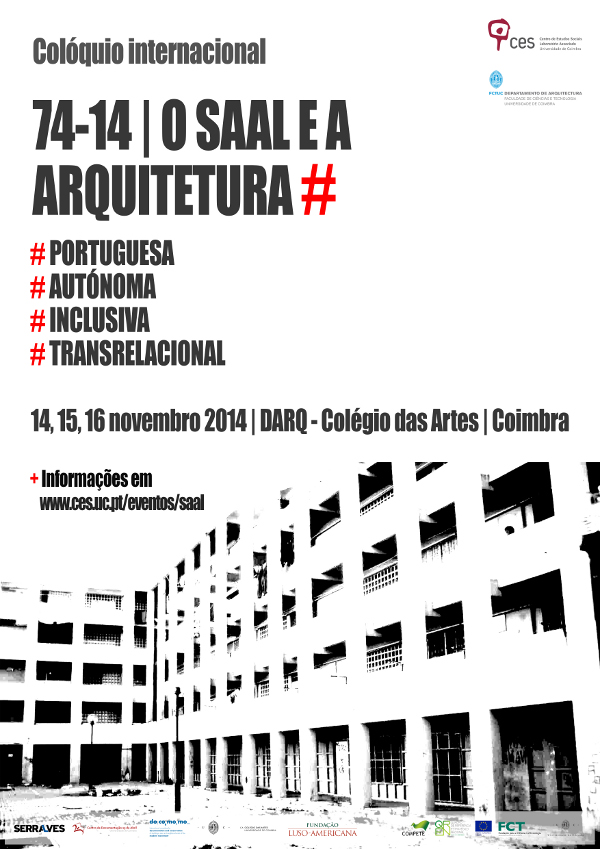International Colloquium
74 14 SAAL # Architecture
November 14-16, 2014
College of Arts and Depart. of Architecture of The University of Coimbra

The Centre for Social Studies and the Department of Architecture of Coimbra University will organize the INTERNATIONAL COLLOQUIUM 74-14 | SAAL AND THE ARCHITECTURE # on November 14, 15 and 16, 2014, in partnership with the Serralves Foundation, Documentation Centre April 25th and Docomomo International.
The collaboration with the Serralves Foundation takes place within the exhibition THE SAAL PROCESS: ARCHITECTURE AND PARTICIPATION, 1974-1976, at the Serralves Museum, from October 31, 2014 until February 1, 2015, and the CONFERENCE SAAL: in retrospective (Serralves Foundation Auditorium, May 10, 2014).
The goal of the colloquium is to discuss SAAL, as an historical model, in light of contemporary circumstances. Today, SAAL permits us to reflect, to question ourselves and to debate the issues and challenges of housing as well as its close relationship with architecture.
Between 1974 and 1976, SAAL emerged as a decentralized and non-bureaucratic service, in a tri-party complex relationship between the state, poor residents and architects. It generated housing. It produced an important reflection about the city and its planning processes. And it made possible the practice of architecture.
This colloquium aims to reflect on and debate contemporary possibilities for the teachings contained in this historic process, redefining the contours of contextual relevance and observant of the constraints of the differences.
This reflection will be based on four converging and interrelated plans, hoping that an expansion of the points of view contained in each of these developments contribute to a more complete overview of the subject of reflection.
#1 PORTUGUESE
The importance of SAAL in the transformation of Portuguese architecture, and in the contemporary moment. In fact, architectural production in Portugal became internationalized with SAAL, and at particular moments even gained the attention of European architectural criticism. Within Portugal, it never ceased to have a residual importance in the political and administrative framework of local governance.
#2 AUTONOMOUS
The second section will focus on the complex web of relationships and interdependencies between architecture and order, and, the more relevant case, between architecture and power. Given its complex and intertwined interaction between poles - contractor, architect, user - SAAL is an ideal opportunity to reflect on the livelihood of the idea of an autonomous architecture in the face of the extreme preponderance of these poles.
#3 INCLUSIVE
The third section will reflect on how SAAL came to focus on opportunities for socially enrooting the idea of housing in urban areas with on the right to the city. The process of the residents’ movement in the 1970s in Portugal, particularly involving the SAAL process, represents a rich historical moment in building a more inclusive idea of the city - involving the poorest residents, on one hand, and enabling these communities to have access to building their own idea of the city, on the other. How can we draw parallels with contemporary global reality?
#4 TRANSRELATIONAL
Finally, there is the growing consideration that SAAL brought forth the breadth of disciplinary interactions that animate the methodological tensions of architectural practice. Today, more than ever, we must reflect on these historical tensions.
REGISTRATION IS NEEDED TO ATTEND THIS EVENT
For registration on the colloquium closing dinner (15/11), organized by the Association Semearrelvinhas SAAL, from Relvinha Neighborhood, please send an email to inescosta@ces.uc.pt. Payment will be made directly at the Restaurant "A Taberna do Aires".
Activity within the research group Cities, Cultures, and Architecture (CCArq)


